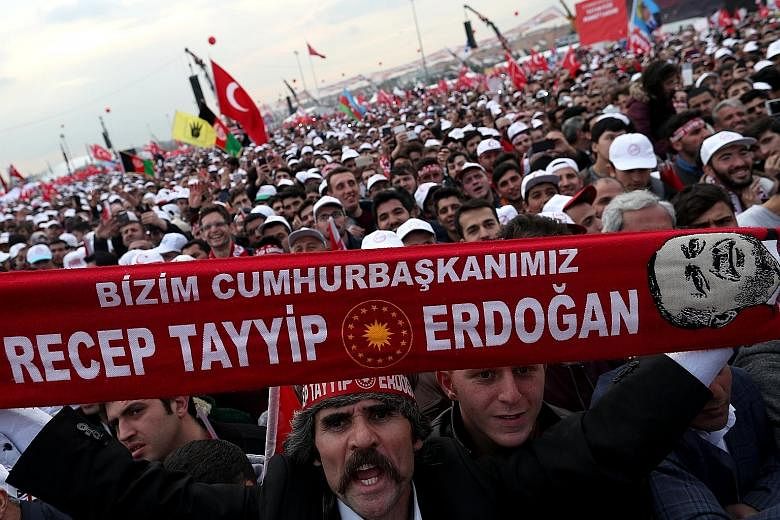ENHANCED OR WEAKENED POWERS?
If he wins the referendum, Mr Erdogan will enjoy enhanced powers, be able to appoint ministers and have an entire bureaucracy centralised within his presidential palace.
But opponents worry that the new system will lack the checks and balances that mark the United States system, moving the presidency towards one-man rule.
If the vote is "Yes", the new system would be implemented from November 2019, when presidential and legislative elections would be held simultaneously.
E.U. INTEGRATION OR DISINTEGRATION?
Relations between Turkey, a longstanding candidate to join the European Union, and its EU partners plunged to bitter lows during the referendum campaign as the President lashed out at Europe for what he said was behaviour reminiscent of Nazi Germany.
Mr Erdogan has said Turkey's membership bid would be "on the table" after the referendum. And in every single campaign speech, he has said that he would sign any Bill restoring capital punishment, a move that would automatically end Turkey's bid to join the bloc.
PEACE PROCESS OR MILITARY ACTION?
Mr Erdogan was the first Turkish leader to undertake peace talks with the outlawed Kurdistan Workers' Party (PKK), resulting in an unprecedented ceasefire.
But the PKK truce shattered in 2015 and Mr Erdogan has since waged a controversial campaign to destroy the group.
In the event of a "Yes" vote, Mr Erdogan could adopt a more reconciliatory attitude, and reopen dialogue.
RECONCILIATION OR POLARISATION?
Mr Erdogan's tenure as prime minister and president since 2003 has starkly polarised Turkey's hugely diverse society.
He has also frequently demonised opponents, saying that those who wanted to vote "No" were playing into the hands of the PKK and US-based Muslim cleric Fethullah Gulen, blamed for the failed July 15 coup.
ECONOMIC RALLY OR DOWNTURN?
Markets are cautiously expecting a "Yes" vote and hoping that this will bring much-needed stability. A rally in Turkish assets is expected in the event of a "Yes".
AGENCE FRANCE-PRESSE

